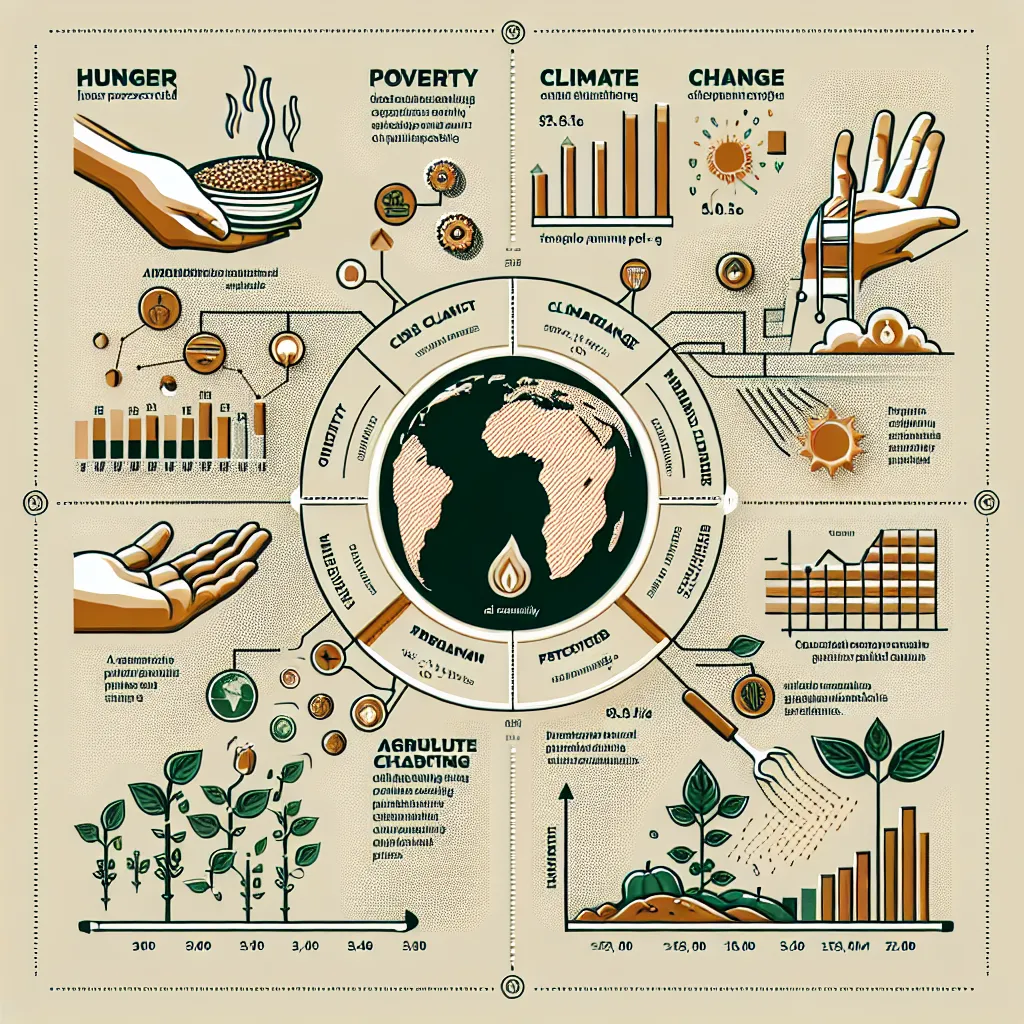Food insecurity is a pressing global issue that has been gaining increasing attention in recent years. As a result, it’s becoming a more frequent topic in IELTS Writing Task 2 essays. Based on analysis of past IELTS exams and current trends, we can expect to see more questions related to food security challenges in future tests. Let’s explore a sample question and provide model essays to help you prepare for this important topic.
Nội dung bài viết
 Food Insecurity Challenges
Food Insecurity Challenges
Sample IELTS Writing Task 2 Question
Let’s examine a typical IELTS Writing Task 2 question on this topic:
Food insecurity is a growing problem in many parts of the world. What are the main causes of this issue, and what measures can be taken to address it?
Analyzing the Question
This question is asking you to do two things:
- Identify the main causes of food insecurity
- Suggest measures to address the problem
It’s important to address both parts of the question equally in your essay. You should aim to provide at least two main causes and two or three measures to tackle the issue.
Model Essay for Band 8-9
Here’s a sample essay that would likely score in the Band 8-9 range:
Food insecurity, characterized by limited access to sufficient, safe, and nutritious food, is indeed a growing concern globally. This essay will explore the primary factors contributing to this issue and propose potential solutions to mitigate its impact.
The main causes of food insecurity are multifaceted and interconnected. Firstly, climate change plays a significant role in exacerbating food shortages. Extreme weather events, such as droughts, floods, and hurricanes, can devastate crops and disrupt food production, leading to reduced yields and increased food prices. Secondly, poverty and economic inequality contribute substantially to food insecurity. Many individuals and families lack the financial means to purchase adequate nutrition, even when food is available in their area.
To address these challenges, a multifaceted approach is necessary. One crucial measure is to invest in sustainable agriculture practices that are resilient to climate change. This could include developing drought-resistant crops, implementing efficient irrigation systems, and promoting regenerative farming techniques that enhance soil health. Additionally, governments and international organizations should work together to create comprehensive social safety nets that ensure vulnerable populations have access to nutritious food. This could involve expanding food stamp programs, school meal initiatives, and community food banks.
Furthermore, addressing income inequality through policies such as progressive taxation, minimum wage increases, and job training programs can help alleviate poverty-driven food insecurity. Lastly, promoting education about nutrition and sustainable food practices can empower communities to make informed decisions about food production and consumption.
In conclusion, while food insecurity is a complex issue with multiple root causes, there are several promising strategies to combat it. By focusing on sustainable agriculture, social support systems, economic equity, and education, we can work towards a future where everyone has access to sufficient, nutritious food.
(Word count: 292)
Model Essay for Band 6-7
Here’s a sample essay that would likely score in the Band 6-7 range:
Food insecurity is becoming a bigger problem in many countries. This essay will look at some of the main reasons for this issue and suggest some ways to solve it.
One of the main causes of food insecurity is climate change. When the weather becomes extreme, like too much rain or not enough, it can destroy crops. This means less food is grown, and prices go up. Another important cause is poverty. Many people don’t have enough money to buy the food they need, even if there is food available in shops.
To fix these problems, we need to take several steps. First, we should try to grow food in ways that can survive different weather conditions. This could mean using new types of seeds that don’t need as much water. We should also help poor people get more money or give them direct help with food. Governments could give out food stamps or provide free meals in schools.
Another good idea is to teach people about healthy eating and how to grow their own food. This can help communities become less dependent on buying all their food from shops.
In conclusion, food insecurity is caused by things like climate change and poverty. To solve it, we need to change how we grow food, help poor people, and educate people about food. If we do these things, we can make sure more people have enough to eat.
(Word count: 228)
Key Writing Tips for This Topic
-
Vocabulary: Use specific terms related to food insecurity, such as “malnutrition,” “crop yields,” and “sustainable agriculture.” For higher band scores, incorporate more sophisticated vocabulary like “exacerbate,” “mitigate,” and “resilient.”
-
Grammar: For band 6-7, use a mix of simple and complex sentences. For band 8-9, demonstrate a wider range of structures, including conditionals (e.g., “If we implement these measures, we could significantly reduce food insecurity”) and passive voice (e.g., “Food production has been affected by climate change”).
-
Structure: Ensure your essay has a clear introduction, body paragraphs addressing causes and solutions separately, and a conclusion. Higher band scores require more sophisticated paragraph transitions and a more nuanced exploration of the topic.
-
Task Response: Address both parts of the question equally. Lower band essays might focus more on one aspect, while higher band essays provide a balanced and comprehensive response.
-
Coherence and Cohesion: Use linking words and phrases to connect ideas smoothly. Higher band essays should demonstrate more sophisticated linking devices and a clear progression of ideas.
Essential Vocabulary for Food Insecurity Essays
-
Food insecurity (noun) /fuːd ɪnˌsɪkjʊərəti/ – lack of reliable access to sufficient quantities of affordable, nutritious food
-
Malnutrition (noun) /ˌmælnjuːˈtrɪʃən/ – lack of proper nutrition, caused by not having enough to eat or not eating enough of the right things
-
Sustainable agriculture (noun phrase) /səˈsteɪnəbəl ˈæɡrɪkʌltʃər/ – farming methods that protect the environment, public health, human communities, and animal welfare
-
Food sovereignty (noun phrase) /fuːd ˈsɒvrənti/ – the right of peoples to healthy and culturally appropriate food produced through ecologically sound and sustainable methods
-
Crop yield (noun phrase) /krɒp jiːld/ – the amount of crop produced per unit of land area
-
Food desert (noun phrase) /fuːd ˈdezət/ – an urban area where it is difficult to buy affordable or good-quality fresh food
-
Regenerative farming (noun phrase) /rɪˈdʒenərətɪv ˈfɑːmɪŋ/ – agricultural practices that reverse climate change by rebuilding soil organic matter and restoring degraded soil biodiversity
-
Food security (noun phrase) /fuːd sɪˈkjʊərəti/ – the state of having reliable access to a sufficient quantity of affordable, nutritious food
-
Subsistence farming (noun phrase) /səbˈsɪstəns ˈfɑːmɪŋ/ – farming or a system of farming that provides for the basic needs of the farmer without surpluses for marketing
-
Agroecology (noun) /ˌæɡrəʊiˈkɒlədʒi/ – the study of ecological processes applied to agricultural production systems
Conclusion
Food insecurity is a critical global issue that is likely to appear in future IELTS Writing Task 2 questions. By understanding the causes and potential solutions, you’ll be well-prepared to tackle this topic. Remember to practice writing essays on related themes, such as the impact of climate change on agriculture, the role of technology in food production, or the challenges of feeding a growing global population.
To further improve your skills, try writing your own essay based on the sample question provided in this article. Share your essay in the comments section below for feedback and discussion with other learners. This active practice will help you develop the confidence and skills needed to excel in your IELTS Writing Task 2.


